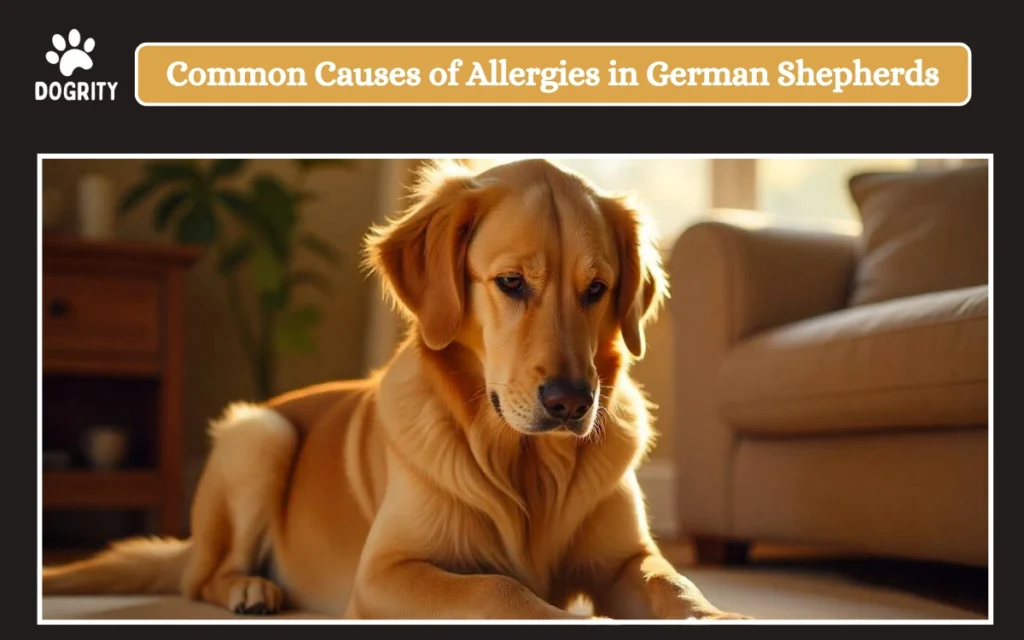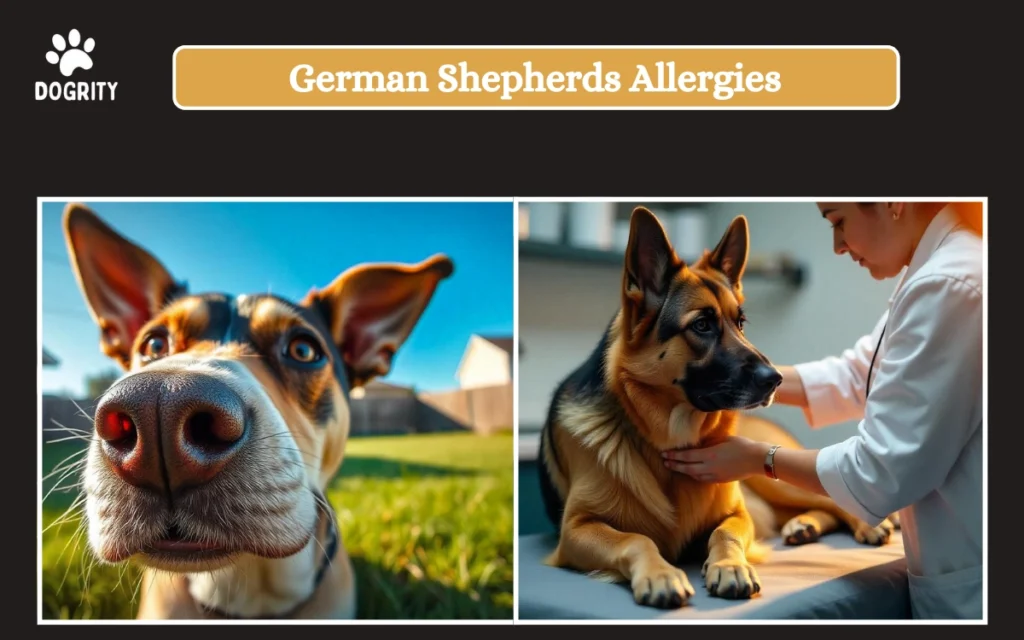German Shepherds and Allergies
Do you scratch your German Shepherd often with skin rashes, ear problems, or sores? You’re not alone. Allergies occur quite frequently in this breed, affecting the skin and the comfort of your pet. In this guide, we will dive into German Shepherd allergies, how to identify symptoms, common allergens, and the best methods to treat and avoid such issues.
Recognizing Allergy Symptoms in German Shepherds
I first noticed the symptoms on my own dog when it kept scratching sometimes with ear infections that I wasn’t even aware about at first as the causes of allergies. Common Symptoms include;
- Itchy Skin: Scratching, licking or even biting at their skin. Look out for red patches, bumps, and scabs, especially in a circular pattern on the paws, belly, and ears.
- Ear Infections: Ear issues tend to develop in most allergic German Shepherds because the wax and bacteria tend to accumulate, causing redness or an unusual smell.
- Digestive Problems: Allergic reactions can also manifest through gastrointestinal issues, like vomiting or diarrhea after the ingestion of some foods.
So, be sure to note any of these symptoms and pay close attention to your dog’s behavior.
Common Causes of Allergies in German Shepherds

German Shepherds have sensitive skin and an immune system that places them vulnerable to many types of allergens. Amongst them, the following is commonly found:
- Food Allergies: Ingredients such as chicken, grains, and specific preservatives can be an issue for some German Shepherds. I learned this the hard way when I realized my dog had reactions to certain proteins.
- Environmental Allergies: Pollen, dust mites, and mold can cause seasonal allergies, especially during certain times of the year.
- Flea Allergies: Even one flea bite can cause a full-blown itching attack from flea saliva and skin irritation.
- Contact Allergies: Some grooming products or materials, such as wool bedding, are also offenders. My dog had once been allergic to a shampoo that didn’t seem so bad at first.
How Allergies Affect German Shepherd Skin & Ears
German Shepherds suffering from skin allergies tend to suffer more from dermatitis. Here, inflamed skin often appears in red scaly patches. Other indications would be hair patches of loss around the area that they scratch, or scabs where the skin broke. Another susceptible area is the ears; if they suffer from ear infections, they are bound to scratch the other side of their head by tilting or shaking them several times.
For German Shepherds, dry skin is another common issue, especially in colder weather or when they don’t have enough essential fatty acids in their diet. This can lead to flakiness and itching, which can make them uncomfortable and worsen existing allergies.
Treatment and Prevention for German Shepherd Allergies
Treating allergies in German Shepherds often takes a combination of home care and vet advice. Some approaches that have worked well for my dog and others include:
Dietary Changes
If food allergies are suspected, switching to a limited-ingredient or hypoallergenic diet can be helpful. Many dog owners have success with grain-free foods or options without common allergens like chicken.
Medications and Supplements
Over-the-counter allergy medicines or prescribed antihistamines can reduce symptoms. Adding omega-3 fatty acids to your dog’s diet can also support skin health.
Topical Treatments and Shampoos
For some, hypoallergenic shampoos may be soothing to irritated skin. I had a medicated shampoo that worked wonders on flare-ups.
Ear Care
For ear infections in dogs, a vet-recommended solution needs to be used for cleaning ears on a regular basis. It helps reduce the buildup of wax and thus the bacteria.
Environmental Control
Cleaning up the home regularly to get rid of dust and allergens may help in reducing the discomfort caused. Washing the dog’s bedding and vacuuming regularly keep allergens from reaching them.
Personal Experiences & Tips

When I started noticing symptoms in my German Shepherd, I felt overwhelmed by all the potential causes. Over time, I learned that a consistent routine and keeping track of symptoms made it easier to spot patterns. For instance, certain foods seemed to trigger skin issues, and regular grooming helped reduce itching.
If your German Shepherd is dealing with allergies, patience and trial-and-error are essential. Sometimes, it takes trying different foods or treatments before finding what works best. Connecting with other German Shepherd owners can also be helpful; sharing experiences can lead to discovering new solutions.
Conclusion
While German Shepherd allergies can be challenging, understanding the symptoms and triggers goes a long way in managing them. By recognizing signs like itchy skin, ear infections, and digestive issues, you can take early action to reduce your dog’s discomfort. Whether it’s through diet adjustments, medicated shampoos, or regular grooming, there are many ways to help your German Shepherd lead a comfortable, allergy-free life.
Remember, always consult your vet before trying new treatments, especially if you’re unsure about specific symptoms. With the right care and a bit of patience, you can manage your German Shepherd’s allergies and keep them healthy and happy.







